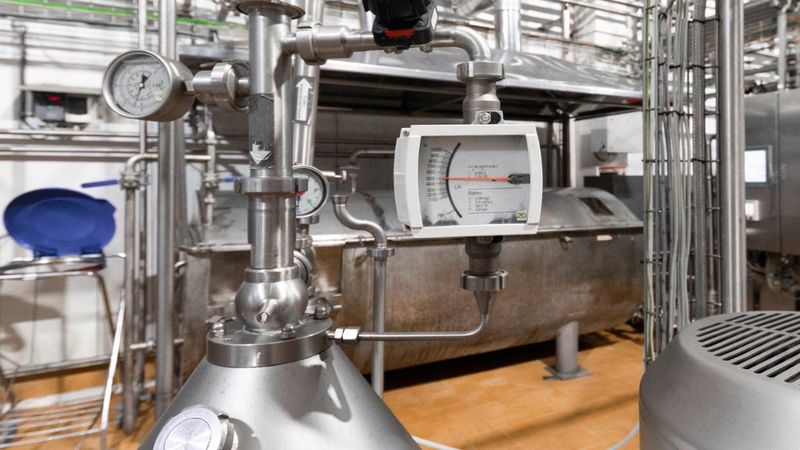The Role Of Sensors In Pneumatic Systems
The primary role of pressure sensors is to make sure the pressure in a pneumatic or hydraulic system is always maintained at the correct level, or at least kept within an optimum range.
This article was first published on
www.rowse-pneumatics.co.ukFrom physically measuring when fluids in glass tubes rose and fell, we’ve progressed technologically to recognising how changes in pressure affect the properties of materials, both physically and electrically. Using modern technology, highly-advanced pressure sensors can measure pressure fluctuations very easily and with unmatched precision and accuracy.
A pressure sensor is simply a device for detecting and measuring changes in pressure. Originally mechanical, such devices could determine how much force was being exerted over a given area and when that amount altered. Pressure sensors today are usually built into pressure regulators. These are automatic valves whose function is to control the pressure in a pneumatic or hydraulic system. By constantly measuring and adjusting the pressure, these valves provide only as much input gas or fluid flow as the system demands, while at the same time keeping the output pressure constant.
How Pressure Sensors Work
There are various principles and methods used to measure pressure, including capacitance, resistance, resonance, temperature, fibre-optics, strain gauges and piezoelectric sensors. The most common method uses a diaphragm or membrane, often made of silicon, which bends when you apply pressure to the sensor. This alters the sensor’s electrical properties, such as voltage, capacitance or resistance. The alteration in properties is converted by the sensor into an output signal, which is used to determine the pressure measurement.
Many modern pressure sensors are designed as stand-alone units, which integrate all the necessary electronic technologies for atmospheric compensation. However, pneumatic systems are getting smaller and more compact, so it’s not always feasible to incorporate the necessary components. Embedded sensors offer a viable alternative, so that the sensor’s electronic components are located elsewhere. This enhances the technological freedom to design sensors for environments characterised by such elements as radiation, vibration and high temperatures. To this end, pressure-sensing chips have been developed that can withstand harsh environments, where the activating medium has contact only with silicon.
Connected Pressure-Sensing Devices
Pressure sensors in Industry 4.0 are designed to collect a constant stream of real-time data, monitoring the performance of hydraulic or pneumatic equipment. Analysis of this data is particularly useful in devising better maintenance strategies, such as using data analytics for predictive maintenance. Based on the information supplied by the sensors, intelligent control systems can predict failure patterns and prepare for breakdowns before they occur.
Installing pressure sensors in pressurised assets such as tanks and actuators enables a pneumatic control system to send out alerts if the pressure falls or rises beyond the specified level. This allows maintenance teams to deal immediately with the problem, rather than reacting to a failure. Pneumatic pressure sensors monitor the physical changes in pressure. Their pinpoint measurements are converted into electric signals, which are displayed as usable data for interpretation. Monitoring these signals allows them to be controlled by electronic devices such as PLCs and tablets.
Applications Using Sensors In Pneumatic Systems
Pressure sensors are valuable in many pneumatic applications, demonstrating their importance and versatility. Pressure sensors also help to ensure the safe and efficient operation of systems. These can be found in many sectors of industry:
Automotive Industry
Pressure sensors are commonly installed in vehicle engines, where they monitor tyre pressure, oil pressure, air intake and exhaust pressure.
Aviation And Aerospace
Pressure sensors are used in this sector for various crucial applications, including fuel system monitoring, cabin pressure control and aircraft altitude measurement. They’re also developing a crucial role in the monitoring and control of drones, or unmanned aerial vehicles (UAVs).
Medical Devices And Healthcare
Pressure sensors have a crucial role in many medical devices, including blood pressure monitors, infusion pumps and ventilators. Providing continuous precision readings has helped enormously to improve patient care.
Industrial Automation
Pressure sensors play a major role in industrial automation, where accurate pressure monitoring and precise control are essential in pneumatic systems.
Environmental Monitoring
From the earliest days of barometers, changes in atmospheric pressure have been used to gauge the weather. Pressure sensors today are of prime importance to oceanography equipment and weather stations, where they use atmospheric and water pressure measurements to forecast the weather and contribute to environmental and climate studies.
How Pressure Sensors Can Benefit Your Business
If you don’t already have pressure sensors in your pneumatic equipment, you can garner numerous benefits by incorporating them into your business operations:
Energy Savings
Using pressure sensors gives you a greater degree of precision in pressure control, which can optimise energy consumption. This will not only provide you with cost savings but also have environmental benefits.
Quality And Efficiency
Sensors monitoring pressure levels generate a constant stream of real-time data. This allows for more efficient system control, which will enhance product quality and reduce waste.
Predictive Maintenance
Analysing the data provided by your pressure sensors allows you to detect anomalies or potential equipment failures. This helps you prevent costly downtime by scheduling timely maintenance.
Improved Safety
Using pressure sensors helps to ensure systems are operating safely, by monitoring pressure levels and preventing them from building up excessive pressure. This helps to mitigate the risk of accidents or injuries and prevents untimely equipment failures.
Why You Need Pressure Sensors
Pressure sensors come in several common forms and are beneficial to many types of application. In many sectors of industry, such as manufacturing, transport or healthcare, pressure sensors play a vital role in pneumatic equipment. They enable the monitoring and precise measurement of pressure levels, which can be critical for the smooth running of your systems. You can analyse crucial data collected by sensors that will help to improve your cost-effectiveness, safety and business efficiency. Integrating differential pressure sensors into your pneumatic systems will save you resources, money and time, while still maintaining optimal performance and reliability.
